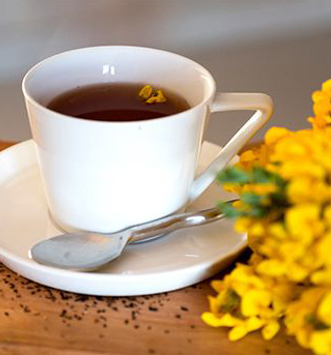
Like rooibos, honeybush originates from the Cape mountains. While its history is not well known, this infusion is highly regarded for its health benefits. It's easy to prepare and pairs well with various flavors. Let's take a closer look at this new herbal tea.
What is honeybush, the honey bush infusion?
Like rooibos teas and mate, honeybush is a drink extracted from a shrub. It only grows in the arid lands of the Cederberg mountain, north of "Cape Town". The plants there are completely organic.
Its scientific name is cyclopia. However, its common name is honey bush. It comes from the scent of its yellow flowers.
Honeybush is made from the leaves of the shrub. They are harvested and dried. Then, the cyclopia leaves are reduced to powder, more or less coarse depending on the product.
Unlike classic infusions like mate, the golden drink contains neither theine nor caffeine.
How did golden herbal tea arrive from Africa?
Each family in "Cape Town" has its own version of the origin of honeybush. Coming from the Cederberg mountain, it was part of the natural products harvested by local tribes. They consumed the herbal tea as a traditional remedy (like red rooibos) and used it for treatments.
With the development of trade, an endless list of maritime companies made stops in South Africa. Some witnessed the treatments provided with honeybush and red rooibos.
According to different opinions, it was these traders who brought the product to Europe. Some mention the Dutch who would have picked several species of cyclopia for treatments. Others speak of the English who would have used the drink instead of the traditional "cup of tea".
What are the properties of the golden infusion from the Cape?
Honeybush has similar properties to red rooibos. This is not surprising since both plants are species of the same family.
Originally, the Khoi tribe was the first to use honeybush for its medicinal properties. But today, this African product is increasingly sought after in traditional health care.
Its composition is exceptional:
- pinitol;
- xanthones (antioxidants);
- vitamins (mainly C);
- minerals.
The honey-flavored plant is recommended for:
- coughs and colds;
- colic;
- aging;
- menopause;
- weight loss;
- lipid balance.
How to prepare a honeybush tea?
Like rooibos, honeybush is an organic infusion. For a golden drink with intense honey aromas, you should steep for 10 minutes in water at 90°C. For dosage, simply use one teaspoon of organic leaves (or one bag) per cup of water.
Cyclopia is rich in antioxidants. Water that's too hot affects its benefits, while cold blocks its aromas. According to specialists, you can let honeybush steep longer, as it doesn't develop the bitterness of teas.
You can add fruit notes to your plain honeybush with strawberry or orange. Vanilla and ginger also pair well with the subtle taste of honey flowers. A nice change from the traditional "cup of tea".
What are the differences between honeybush and rooibos?
Rooibos (red or green) and honeybush are related plants. Free from the theine found in teas, these two infusions mainly differ in taste, color, and benefits.
While red rooibos develops a nutty and fruity aroma, honeybush has a pleasant wild honey scent. The red color of rooibos also contrasts with the golden reflections of its brother shrub. As for medicinal properties, they are complementary. Only the presence of pinitol gives an expectorant effect to the golden infusion from "Cape Town".
Which honeybush tea to choose as a gift?
Organic honeybush is making a remarkable entry into the world of gift sets. Instead of coffee or tea, products based on the "Cape Town" plant are winning all the votes.
The list of accessories in gift sets is immense. However, the "bag" formula is the most popular. It allows for varied herbal teas with exotic notes full of flavor:
- strawberry and vanilla;
- orange and ginger;
- organic red rooibos.
To retain the benefits of cyclopia, the weight of the plant must be greater than that of other ingredients. Many accessories allow infusing honeybush and rooibos, but the "bag" version is sometimes more accessible.